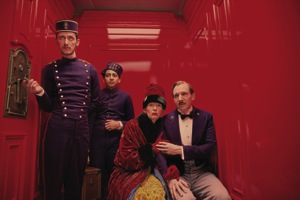
dvd of the week
In Wes Anderson’s greatest film so far, it is 1932 and the Grand Budapest Hotel is in its heyday. A treasure of the fictional Eastern European nation of Zubrowka, it is packed with suited dignitaries and their bejeweled wives, and the regimented staff is legion; over all of it presides the hotel’s slightly foppish and nearly over-competent concierge M. Gustave, played by a miraculous, David Niven-inspired Ralph Fiennes. Gustave is not only devoted to his hotel, but also to the numerous lonely older women who frequent it and his favorite is Madame Desgoffe-und-Taxis (Tilda Swinton), an 84-year-old countess who adores Gustave. When the countess dies, Gustave and his favorite bellboy Zero (Tony Revolori ) go to the reading of the will. The countess’ dastardly son Dmitri (Adrien Brody) is livid that Gustave is given a priceless painting called Boy With Apple and demands that this never happen, but with Zero’s encouragement and help, Gustave steals the painting and returns to the hotel. The caper that ensues is thrilling and hilarious and full of idiosyncratic supporting figures played by the likes of Willem Defoe, Saoirse Ronan, and Harvey Keitel. The actors are directed to such mannered behaviors as to be almost abstracted; they archly speak as if they have hopped out of a Roald Dahl or JD Salinger story, and they move like gorgeously drawn cartoon characters, sharply and exaggerated, influenced by slapstick and mime. The result is the opposite of natural or subtle, but Anderson’s direction, of actors and art and photography, communicates the themes and emotions – the sadness of nostalgia and growing up, the power of loyalty and courage – with something approaching grace.











